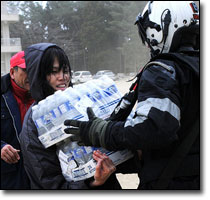A little more than a week after the historic earthquake, tsunami and nuclear emergency in Japan, journalists are beginning to reflect on our profession’s performance. How good a job of getting the news and informing the public have we been doing?
The run on iodine tablets up and down the U.S. west coast is a discouraging example of the limited ability of the many balanced news reports about radiation risk – and iodine risk, including serious allergic reactions – to quell panic-buying. It’s Cipro and anthrax all over again.

Recently, AHCJ posted a statement about some of the ethical issues that face journalists reporting from disaster zones. The statement focuses on the public service value of reporting from disaster zones and the imperative that the spotlight must remain on the people and events reporters observe, not the reporters themselves.
“In summary,” the statement concludes, “do not exploit vulnerability for gain or glory.”
Each disaster is different. The people of Japan are not interchangeable with the people of Haiti. Nevertheless, journalists inevitably encounter people who need help. The need may be for a bottle of water or for urgent medical care. Aid should be given freely, without creating a sense of obligation. When one hand offers a thirsty person a bottle of water, while the other hand holds a microphone, is consent to be interviewed truly unencumbered? Or does such an exchange inevitably plant the thought in a person’s mind that the interview is payment for the water?
There are legions of aid workers moving into the northeast coastal region of Japan. Reporters seeking to tell stories of the people providing care and those receiving it should have no trouble finding examples. Stories that feature the acts of a reporter have an inherent “look at me!” aspect that offers no additional value to readers and audiences.
Every day and every story is unique, so it is impossible to say without exception how a journalist should act in each and every circumstance; yet when we intrude on a scene of personal suffering, we should always remember why we are there.




